Pain Doesn't Lie: Hard Candy (David Slade, 2005)
On seeing your own shape clearly.
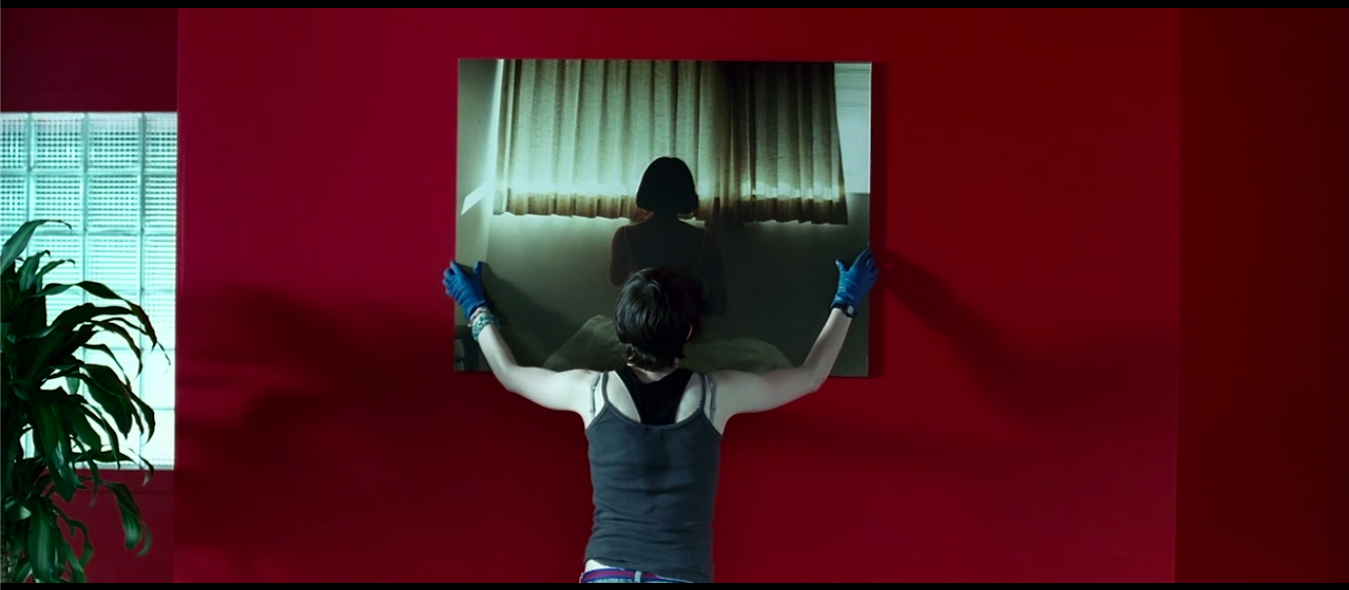
Welcome back to THEY WANT REVENGE. Subscriptions this month are 30% off with the code HALLOWEEN21; all new subscription income from this month will be donated to the National Network of Abortion Funds. This month is dedicated to the best horror about sexual assault and violence; I aim to be survivor-focused, but the movies can be intense, so judge your own limits.
If you want to support me directly, MAW is currently available at comic shops and digital retailers including comiXology, Kindle, and Google Play. Issue #2 will be out on October 20; you can read the first five pages here.
“I mean, I had a moment,” my oldest friend told me. “I was like, wait a minute. Did I learn about feminism from a man?”
It was her first time seeing me since my coming-out announcement. We were drinking in a hotel bar on a Manhattan rooftop, watching lucky children splash around in the pool. I hadn’t been to New York since before the pandemic, so all of my changes had happened outside her range of vision; I’d known her for fifteen years, I realized, and she was meeting me for the first time.
I didn’t mind her moment. I’d spent all summer hearing less gentle versions of the same question. It’s the big, weird thing about me, the part that makes people uncomfortable: I’ve covered gender for over a decade, but I didn’t tell you mine. I made a name writing about “women’s issues” and “violence against women,” but my name back then was a woman’s name. Now, the things that made my writing useful make it morally suspect; I may be an interloper, a voyeur, a self-appointed expert on an experience I do not share.
This strikes me as too simple on a few fronts – starting with the word man, which I corrected at the time. Yet it's a hard question to answer, and what's worse, most of the hall passes I get are, in and of themselves, transphobic – that I have "female socialization," or that I "used to be a woman," or all those other phrases people use to mean you're not a real live boy.
I am real. I have also experienced misogyny. "Gender” describes two interlocking phenomena, the complex internal experience of gender and the political system which enforces an invented binary on us all, and which either grants or refuses social power based on the role you’ve been assigned. My internal sense of self is at odds with my assigned role, which is what makes me transgender, but when it comes to gender as a political sorting system, trans people have more experience of being refused power than they do of having it granted. The simple binary of “man=powerful, woman=powerless” does not account for every human variation.
I can try to go into all that, and all the complications. (Even closeted trans women experience misogyny; even transgender white people are white; trans men are men, and as such, they can be sexist and receive gender-based privileges; etc.) I can say that my feminism is a direct result of my trans experience; many people believe the political system of gender is “natural,” but being assigned the wrong role tends to make you aware that the system is arbitrary and cruel. I can say that trans people have always been feminists. I can say that all forms of transphobia are linked to misogyny, and that you can’t fight one without fighting the other. I can use newer and more precise terms like “gender-marginalized.”
I can say all that, but I still wouldn’t be saying the thing that would actually help my friend understand our history, which was that when she first met me, and we first started talking about feminism together, she could not stop telling me how much she thought I would vibe with “the little kid from Hard Candy.”
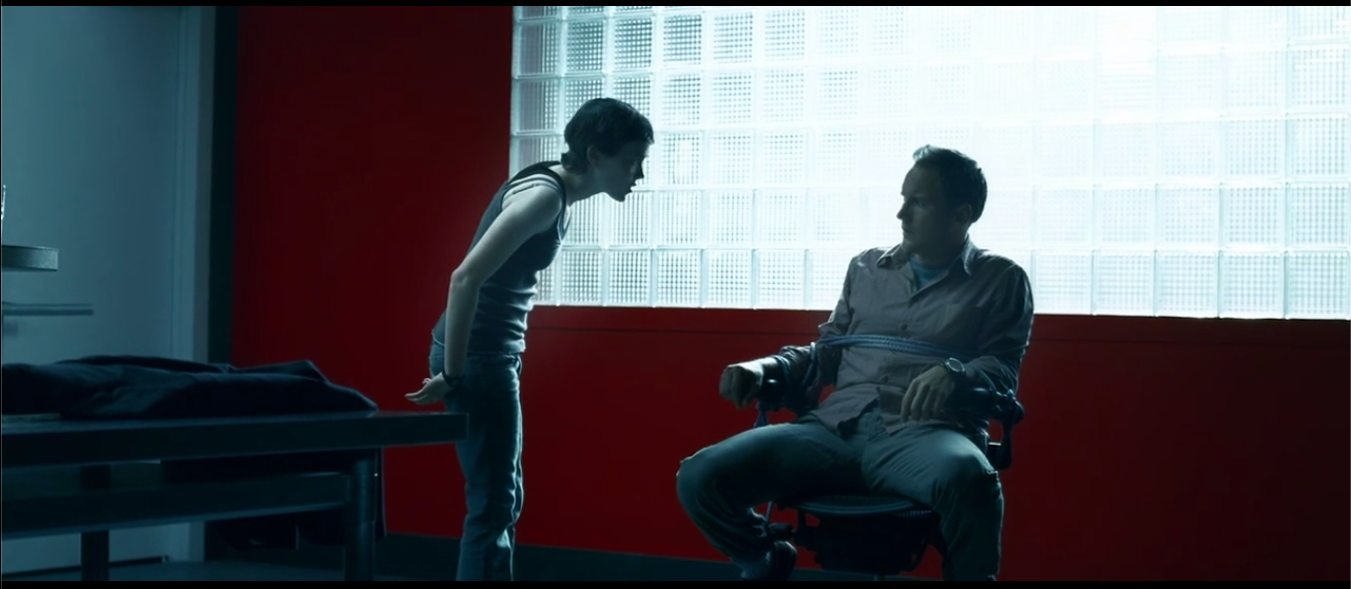
Hard Candy seems like it ought to be everywhere in 2021. It was the feature debut for David Slade, whose house style (painterly compositions; fast, brutal action; grainy bleached-out palette punctuated with bright, bright red) has become hugely influential, thanks largely to Hannibal and his other TV work. Its premise — teenager traps a pedophile and tortures him into confessing — is high key #relevant in 2021. The actors, then mostly unknown, have all become huge deals: Patrick Wilson, the most beloved and ubiquitous scream queen of the 21st century, started his horror career here. Elliot Page gives what might be his best performance. Even the nosy neighbor with a five-minute cameo is Sandra fucking Oh.
Hard Candy is begging for a renaissance, and yet, talking about it worries me; “rape-revenge” is a heavily feminized genre, and Elliot Page, who was only seventeen years old when he made this thing, was not seen as he wished to be seen in 2005. I wondered if it might be inconsiderate to include Hard Candy in a round-up of rape-revenge movies. I thought it might constitute gawking or misgendering.
Yet Hard Candy is a truly great rape-revenge movie, and Elliot Page has always been trans. In fact, I would argue that Hard Candy features his best performance precisely because it leans hard into masculinity and gender fluidity, in ways later fame made him unable to do. Contemporary audiences will see Page clearly, in a way viewers in 2005 were unable to, and aside from a few awkward word choices and lines of dialogue, it changes hardly anything to view this as a story about a teenage boy.
The changes that do happen are illuminating. So I’ll use “he” for Page here — “they” would also work, but “he” does the most to cut across the grain and help you see what you’re seeing. Let’s get started.
Hard Candy is a two-hander; nearly all the action takes place in one apartment, and Page and Wilson are the only actors with more than a handful of lines. (Sorry, Sandra Oh.) There’s a brief prelude at a coffee shop, where we see a poster informing us that a teenage girl has disappeared. At the same time, we learn that Patrick Wilson has been grooming a fourteen-year-old he met online, and the fourteen-year-old — Elliot Page, cute and bubbly and saddled with dialogue about how much he loves “obscure bands” like “John Mayer and Coldplay” — agrees to go back to his place to consume a “bootleg MP3” of “the Goldfrapp concert.”
Neither actor will stop saying “Goldfrapp” or “MP3” during this sequence, I have to tell you. It adds a whole new level of discomfort to the impending sexual assault. If you were in any way unaware of where you fall on the youth/age spectrum, this movie, which really doesn’t seem like it was made that long ago, will inform you.
Back at the creep’s apartment, Page starts mixing screwdrivers and taking his shirt off, and we brace for the worst. We don’t get it, but Patrick Wilson does. He passes out before he can try anything, and when he wakes up, he’s strapped to a chair, with Elliot Page looming over him and threatening to pour bleach into his mouth if he screams. This new boy has questions about the missing girl, and he is not cute or bubbly at all.
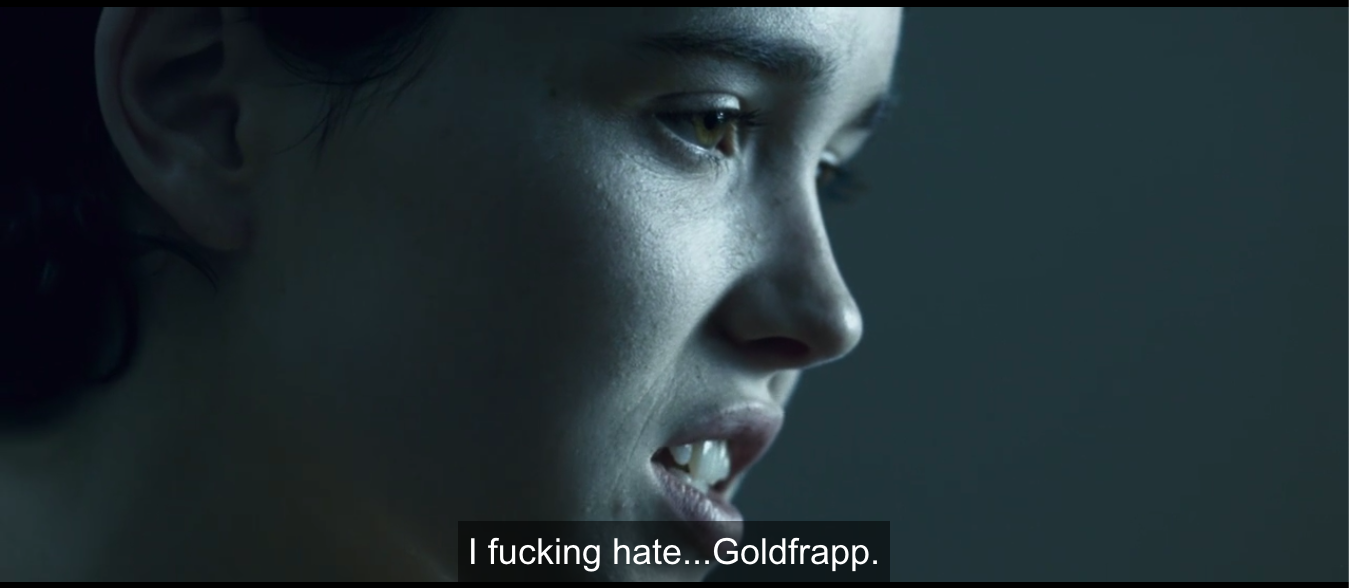
Let’s get this out of the way: Hard Candy is Audition. More specifically, it’s the final act of Audition, stretched out to feature length. We’re watching one long sequence of psychological and physical torture, inflicted on an affable-seeming but deeply shitty man, by a ruthless sadist who is scary precisely because he initially seemed meek and defenseless, with the goal of making the victim admit he hurts girls. The torture is more extreme, as are the crimes of the accused, but the resemblance is never subtle.
Then again, Audition is one of my favorite movies. If the world wants to give Jude Doyle a transgender, English-language Audition directed by the guy who did the best episodes of Hannibal, how can I refuse?
I cannot. In fact, I have always had a weird and disproportionate and until-recently-inexplicable thing for this movie. The very first edition of this newsletter, back in 2017, when it was still on TinyLetter, was about Hard Candy. I thought it was the apex of something, the single most successful attempt at making horror out of gender. Those feelings often swirled around Page’s performance; his character seemed ideal to me, perfectly realized. A perfectly realized what, I didn’t know.
I mean, I truly think Hard Candy is a good movie. The dialogue hits all the post-#MeToo beats with eerie precision, right down to the bit where Patrick Wilson says he can’t possibly be a rapist because of all the great work he’s done “for the environment.” (Does the environment have teenage girls in it? Because that seems like it would be a problem!) Page’s contemptuous refusal to accept Wilson’s many excuses read as “sociopathic” to critics in 2005 — of course it did — but it now seems like the only reasonable reaction, a pure and holy embodiment of collective rage. This kid is only fourteen years old, and he’s already fucking done.
Yet, in 2021, I have a name for the happy recognition I felt when I saw Page, that weird certainty that yes, this is how a person should walk, should speak, should move, should be. It’s an unsavory response to a two-hour-long torturefest where Patrick Wilson gets non-consensual bottom surgery, but there it is. The feeling I have watching Hard Candy — lighter, prouder, more at ease in my body, able to move a little more freely, to be less self-conscious — is gender euphoria.
I don’t have this reaction to all of Page's movies. There’s a muted, opaque quality to his performances in things like Umbrella Academy or Inception, a sense of not quite being accessible or present. The viewer reaches out to connect and finds themselves bouncing off an invisible shield. Of course, stillness and stoicism are how a lot of people express masculinity — not me! I have a Nerf cannon of emotion perpetually pointed at the reader’s face — but Page’s stillness never felt chosen to me. It seemed more like sadness and hanging back.
There is a much more kinetic, lively performer in Elliot Page, one I suspect we will see more often now, and Hard Candy is my evidence that he’ll be great. There’s a casual machismo to how Page inhabits this role: Scratching his eyebrow with his thumb in irritation, swaggering across a room, flopping onto a couch in disgust. The performance is several degrees more physical than we’re used to seeing from him. Consider the bullying lean over Wilson in their first real conversation — legs apart, shoulders forward, chin out, like a frat boy who just heard you badmouth his mother — or the brute efficiency in how he manages to stomp Wilson onto the floor and tase him into submission. Patrick Wilson is not a small guy, and Elliot Page is not a large one, yet the physical power imbalance very rarely tilts in Wilson’s direction.
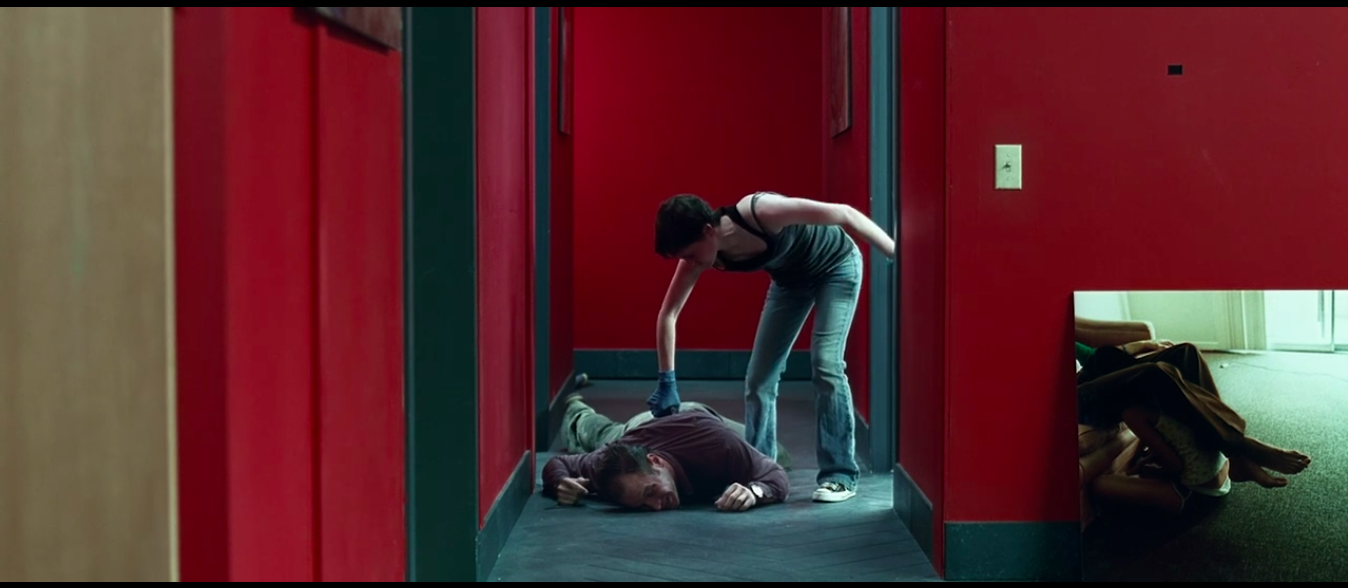
I’m not hyping Page's masculinity out of bro instinct. It seems like a conscious choice for the role. Hard Candy rests on the objectively comedic premise that a grown man in his thirties could be both outwitted and physically overpowered by a middle school student. Page’s performance is the only reason you’re not laughing. On his own, at seventeen years of age, he has to turn the dial from “Macaulay Culkin in Home Alone” to “Robert De Niro in Cape Fear,” and it works. He scares you.
Page’s boyishness likewise seems integral to the role. The hyperfeminine, sexualized “Lolita” character he performs in the first act is a predatory man’s fantasy, and we quickly learn how disconnected he is from that performance. The “girl” Patrick Wilson picks up — a construct made mostly of adult men’s ideas about what “girls” should be — is not the person we meet when the other shoe drops. The most effective way for Page to convey the shift is to relax his gender performance a little, and the script plays along: Hard Candy is a movie which announces that Shit Hath Gotten Real by having Page take off his skirt and put on pants.
Gendered queerness is always part of the scene in Hard Candy, flickering through the movie in ways both subtle – at one point, Page taunts Wilson by slipping into his suit jacket and glasses, essentially wearing him as a costume; when Wilson has the temerity to mention Page "being with a guy on [his] wedding night," Page gives him the gayest side-eye in all Creation – and not. (Again, the movie's climax is non-consensual genital surgery.) The occasional lines of dialogue wherein Page is referred to as a “girl” don’t so much snap us out of the movie as invite us to look deeper. We are looking at a boy, but a boy who sometimes gets mistaken for a girl; a boy who is targeted in some of the same ways girls are; a boy whose social performance is on a two-second delay from his inner self, and who is enraged by the role he’s been assigned in other people’s fantasies. That anger may be different than a cis boy's, but it is also noticeably different than a cis woman's. A common enemy is not the same as a common experience, but the enemy is common, indeed.
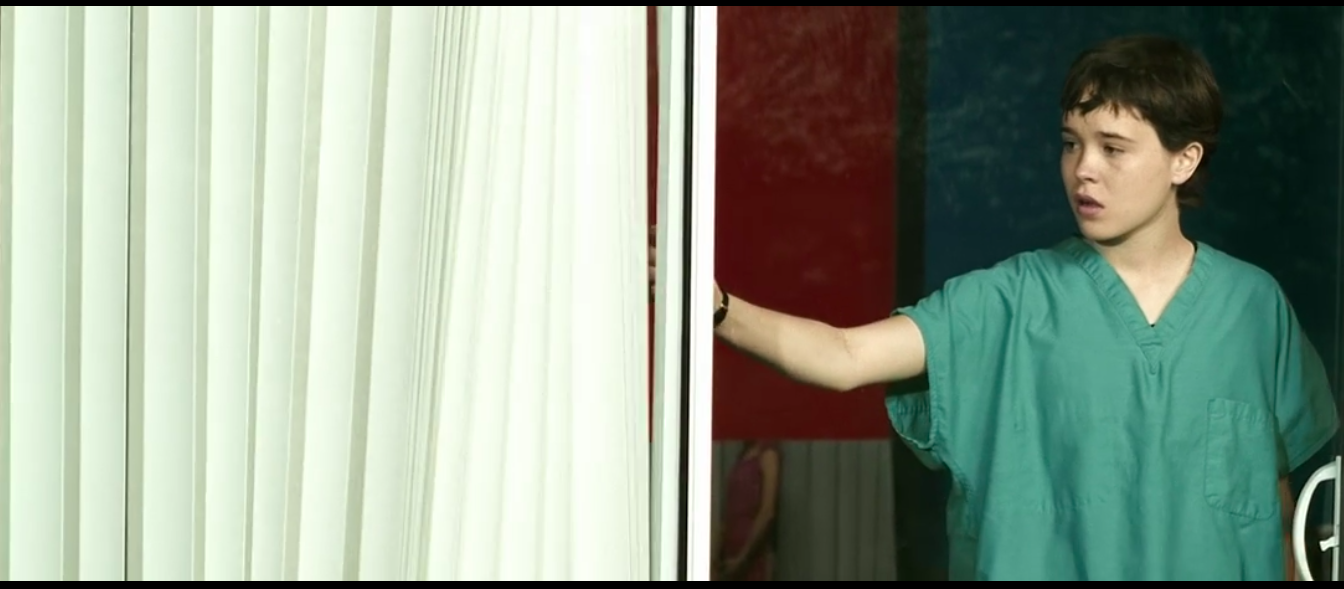
My friend was right: I really, really vibe with the kid from Hard Candy. She thought I would see something of myself there, and I did. Maybe it’s too much to think she saw me, but there was a common something she could point to, a shadow on the wall that almost lined up with mine. My friend met me fifteen years ago, and she met me again this summer, but somehow, she knew something important about me before I — or maybe Elliot Page — knew it. That’s a start.
Why do I write about sexual violence? Because it happened to me. Because it happened to people I cared about. Because I have pretty much never gotten close to a woman without learning that something awful had happened to her, and it scared me to learn that certain forms of supposedly unspeakable violence were actually very common, and that no-one really cared, because the victims were mostly women and girls. It was frightening and infuriating to learn that some people had more value than others, and that the people deemed worthless could be hunted for sport by the ones in charge; it's infuriating that I even have to explain this to you. You don’t have to be female to see why torturing women for fun is wrong. It's just that most people who aren't female choose not to see.
Sexual assault is about power, the cliche goes. It’s about dominance, status, establishing the social hierarchy. It’s a crime of humiliation, intended to show the victim how little they matter. Sexual assault flows downhill, from people with power to people with less: Adults do it to children, white people do it to people of color, cis people do it to trans people, and men do it to women. The power disparity between men and women is the most visible, in part because straight, cis men and women vastly outnumber everyone else — even taking into account equivalent rates of violence in same-gender relationships, 97% of abusers are men with female partners — but it’s not the only one that exists. The vast majority of abusers are straight men, but 47% of trans people have been sexually assaulted.
I like rape-revenge stories because they are honest about how power operates. The hunters get hunted, the prey turns and chases the predator with bared teeth. Rape-revenge plots reverse power disparities in order to reveal the ones we currently have. If you read Elliot Page in Hard Candy as a boy, the rape-revenge plot still works, because it is still a story about a power imbalance. Patrick Wilson is an adult and Elliot Page is a child. If you read it as a story about a cis adult and a trans child, that power disparity gets steeper. Lots of my own hard stories look this way to me now: Different, but no more excusable. The power disparity has been renamed, but it isn’t gone.
So why did I write about women? Because I had been told I was one; because I had undergone a lot of training, some of it violent, to make me act like one; because women matter, and what happens to them matters; because I knew women mattered, but still found “woman” uncomfortable, a persistent friction, like a blister rising in a new pair of shoes. I examined “womanhood” like examining a wound, to find out what was wrong with me. I was always telling the truth, but I didn't always have adequate language for it: How many times did I say woman when I meant traumatized by gender? How many times did I say woman in order to say humiliated, or sexually assaulted, or not taken seriously?
Does woman only ever mean powerless? Is lack of power the sum total of the female experience? If I say that, am I not also saying that powerful can only ever mean man?
“People lie. Pain doesn’t lie,” says Asami, in Audition. “When you’re in pain, you can see your own shape clearly.” It’s a great line, even if it doesn’t make any sense. Torture produces bad information. Pain creates more confusion than it solves. I prefer to think that pain, like joy, comes from an honest place within us, and the trouble comes when our conscious minds have to come up with words to explain it. We know what hurts before we know why it hurts; my pain was still real when I attributed it to a different set of causes, just as my brain lit up watching Hard Candy before I knew that Elliot Page and I were trans. What’s true has always been true, but I had to wait for the facts to catch up with the certainty, for the correct words to form around the experience. Here they are. Here he is. Here I am.
Hard Candy is streaming on Amazon Prime.
At my other job, I wrote about how, yes, people are overusing mental health jargon on social media – and no matter how annoying it is, it's better than shame and silence.
Finally, a word: We're back in a familiar situation, with a powerful media company – in this case, Netflix – platforming TERFs and insisting that it bears no responsibility for the resulting violence. Netflix also briefly suspended a trans employee for protesting their decision on Twitter, then reinstated her after a round of bad press. Trans Netflix employees are staging a walkout on October 20. Consumers are encouraged to cancel their Netflix subscriptions in solidarity.
In the interests of transparency, I'm not currently able to cancel my subscription – I'm not the one who pays for it – so this newsletter is my best way to express solidarity. I will not be recommending or reviewing any Netflix exclusive content for the foreseeable future. I will point you to content that's available on other platforms until they get their shit together and/or I hear from the organizers of the walkout that they're satisfied. I know that a lot of great people work for Netflix, including some friends, and I would love to promote and recommend their work. Hopefully I will be able to do that soon.